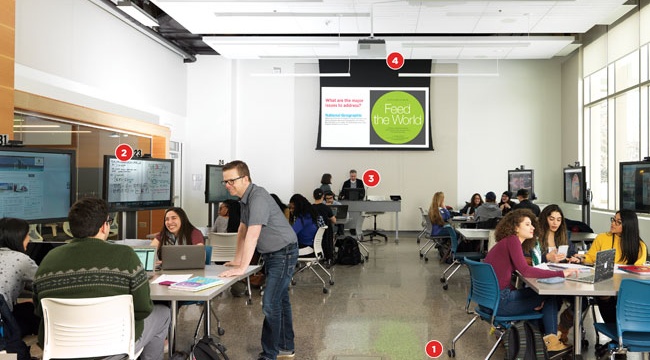Taylor Institute for Teaching and Learning
Global Challenges

Like the course name, Global Challenges, suggests, this class begins with a big and messy problem: How will we feed 9 billion people? It’s a question an eclectic group of 22 first-year students is attempting to answer in this inquiry-based course — the first to be taught at the College of Discovery, Creativity, and Innovation (CDCI) in the new Taylor Institute’s arm for interdisciplinary learning experiences and undergraduate research.
Pop into this learner-driven environment and you’re likely to find a professor, perhaps a guest speaker, in one of the five studios, but gone is the traditional “sage on stage” setup. Instead, the facilitators might start the class with a PowerPoint presentation loaded with, say, images of farms around the world. If it’s guest speaker-farmer Brenda Schoepp’s turn, you might just see personal shots of her wielding a machete in Cuba, explaining that country’s “chop-and-drop” system of farming, or standing next to a bony (but “dual-purpose”) cow in India.
She peppers her presentation with provocative statistics — it takes 10 days to starve a city in North America; most farms are 1.3 to 3 acres in size (in Canada, however, the average is 495 acres); it will cost $53 trillion to develop a global infrastructure to fix our broken food-distribution systems. Students, afterward, swivel around in little clusters to discuss the challenge.
Some presentations focus on the connection between gender equity and global food challenges, while other groups debate climate-change issues and how to tax food waste. Twenty minutes later, the students roll their chairs into a circle, wirelessly connect laptops to 50-inch touch screens and share their findings with each other. Questions and interests guide the inquiry process, which is open-ended and tends to generate lively discussions that veer in various directions.
“In designing the content for Global Challenges, we were looking for a problem or a theme that is a major issue of concern to society,” explains CDCI director Jay Cross. “One that would require interdisciplinary collaboration in order to make the world a better place, and also one that captures the imagination of undergrad students who are looking to develop new ideas and want to be actively involved in their own learning.






